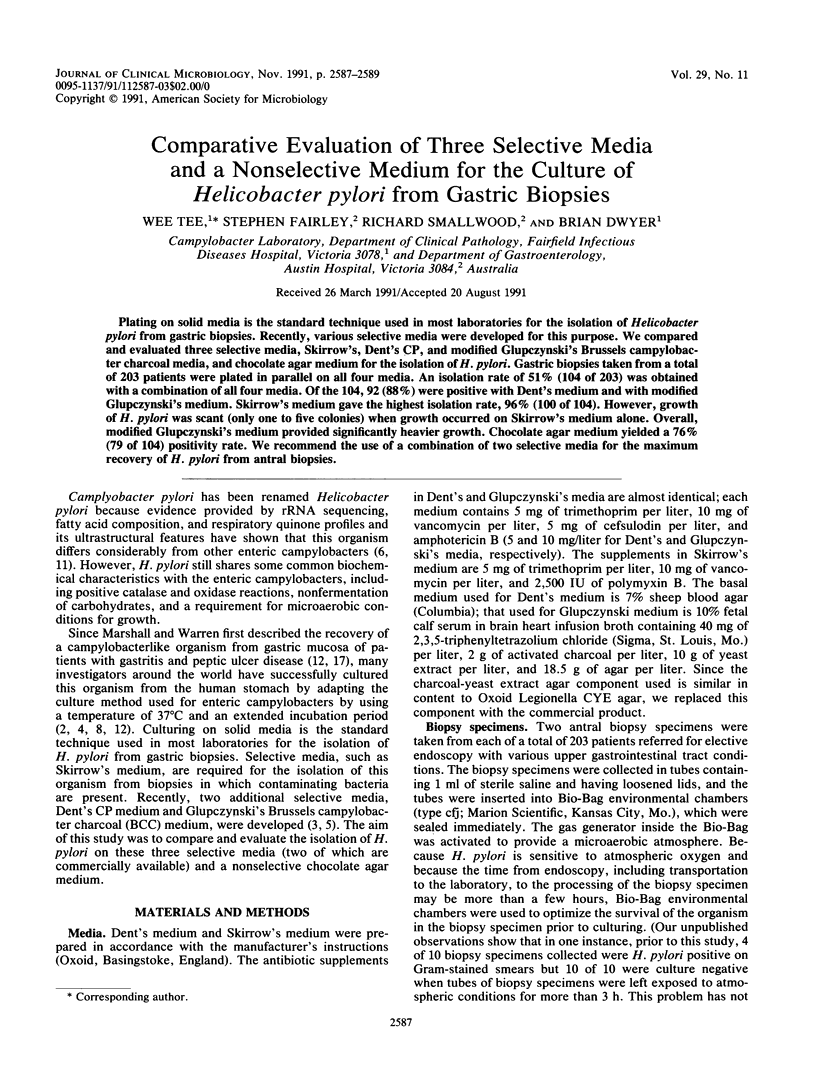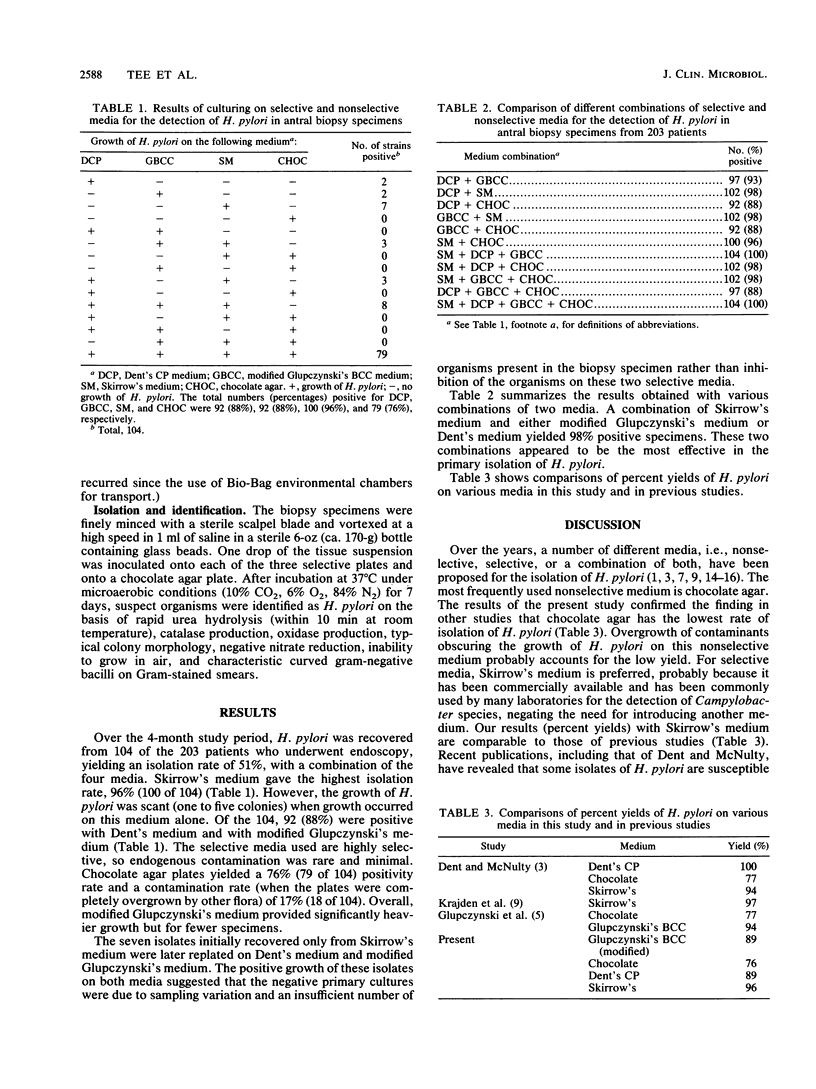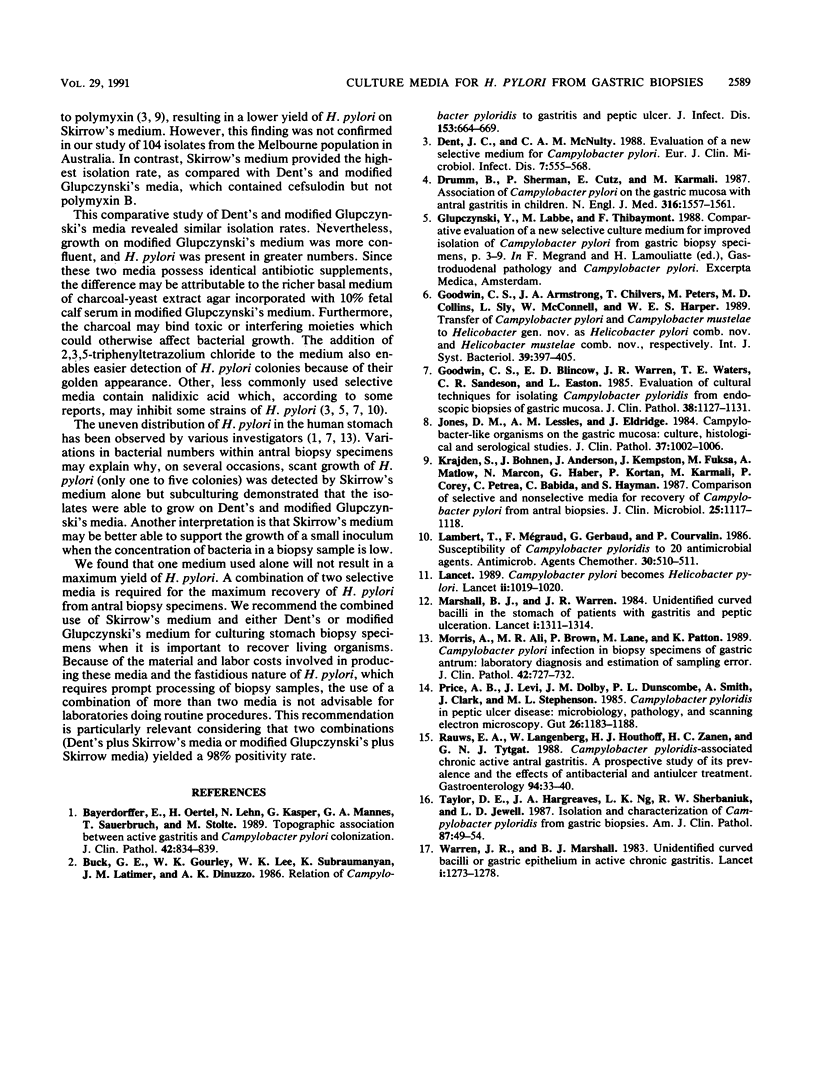Abstract
Plating on solid media is the standard technique used in most laboratories for the isolation of Helicobacter pylori from gastric biopsies. Recently, various selective media were developed for this purpose. We compared and evaluated three selective media, Skirrow's, Dent's CP, and modified Glupczynski's Brussels campylobacter charcoal media, and chocolate agar medium for the isolation of H. pylori. Gastric biopsies taken from a total of 203 patients were plated in parallel on all four media. An isolation rate of 51% (104 of 203) was obtained with a combination of all four media. Of the 104, 92 (88%) were positive with Dent's medium and with modified Glupczynski's medium. Skirrow's medium gave the highest isolation rate, 96% (100 of 104). However, growth of H. pylori was scant (only one to five colonies) when growth occurred on Skirrow's medium alone. Overall, modified Glupczynski's medium provided significantly heavier growth. Chocolate agar medium yielded a 76% (79 of 104) positivity rate. We recommend the use of a combination of two selective media for the maximum recovery of H. pylori from antral biopsies.
Full text
PDF


Selected References
These references are in PubMed. This may not be the complete list of references from this article.
- Bayerdörffer E., Oertel H., Lehn N., Kasper G., Mannes G. A., Sauerbruch T., Stolte M. Topographic association between active gastritis and Campylobacter pylori colonisation. J Clin Pathol. 1989 Aug;42(8):834–839. doi: 10.1136/jcp.42.8.834. [DOI] [PMC free article] [PubMed] [Google Scholar]
- Buck G. E., Gourley W. K., Lee W. K., Subramanyam K., Latimer J. M., DiNuzzo A. R. Relation of Campylobacter pyloridis to gastritis and peptic ulcer. J Infect Dis. 1986 Apr;153(4):664–669. doi: 10.1093/infdis/153.4.664. [DOI] [PubMed] [Google Scholar]
- Campylobacter pylori becomes Helicobacter pylori. Lancet. 1989 Oct 28;2(8670):1019–1020. [PubMed] [Google Scholar]
- Dent J. C., McNulty C. A. Evaluation of a new selective medium for Campylobacter pylori. Eur J Clin Microbiol Infect Dis. 1988 Aug;7(4):555–558. doi: 10.1007/BF01962615. [DOI] [PubMed] [Google Scholar]
- Drumm B., Sherman P., Cutz E., Karmali M. Association of Campylobacter pylori on the gastric mucosa with antral gastritis in children. N Engl J Med. 1987 Jun 18;316(25):1557–1561. doi: 10.1056/NEJM198706183162501. [DOI] [PubMed] [Google Scholar]
- Goodwin C. S., Blincow E. D., Warren J. R., Waters T. E., Sanderson C. R., Easton L. Evaluation of cultural techniques for isolating Campylobacter pyloridis from endoscopic biopsies of gastric mucosa. J Clin Pathol. 1985 Oct;38(10):1127–1131. doi: 10.1136/jcp.38.10.1127. [DOI] [PMC free article] [PubMed] [Google Scholar]
- Jones D. M., Lessells A. M., Eldridge J. Campylobacter like organisms on the gastric mucosa: culture, histological, and serological studies. J Clin Pathol. 1984 Sep;37(9):1002–1006. doi: 10.1136/jcp.37.9.1002. [DOI] [PMC free article] [PubMed] [Google Scholar]
- Krajden S., Bohnen J., Anderson J., Kempston J., Fuksa M., Matlow A., Marcon N., Haber G., Kortan P., Karmali M. Comparison of selective and nonselective media for recovery of Campylobacter pylori from antral biopsies. J Clin Microbiol. 1987 Jun;25(6):1117–1118. doi: 10.1128/jcm.25.6.1117-1118.1987. [DOI] [PMC free article] [PubMed] [Google Scholar]
- Lambert T., Mégraud F., Gerbaud G., Courvalin P. Susceptibility of Campylobacter pyloridis to 20 antimicrobial agents. Antimicrob Agents Chemother. 1986 Sep;30(3):510–511. doi: 10.1128/aac.30.3.510. [DOI] [PMC free article] [PubMed] [Google Scholar]
- Marshall B. J., Warren J. R. Unidentified curved bacilli in the stomach of patients with gastritis and peptic ulceration. Lancet. 1984 Jun 16;1(8390):1311–1315. doi: 10.1016/s0140-6736(84)91816-6. [DOI] [PubMed] [Google Scholar]
- Morris A., Ali M. R., Brown P., Lane M., Patton K. Campylobacter pylori infection in biopsy specimens of gastric antrum: laboratory diagnosis and estimation of sampling error. J Clin Pathol. 1989 Jul;42(7):727–732. doi: 10.1136/jcp.42.7.727. [DOI] [PMC free article] [PubMed] [Google Scholar]
- Price A. B., Levi J., Dolby J. M., Dunscombe P. L., Smith A., Clark J., Stephenson M. L. Campylobacter pyloridis in peptic ulcer disease: microbiology, pathology, and scanning electron microscopy. Gut. 1985 Nov;26(11):1183–1188. doi: 10.1136/gut.26.11.1183. [DOI] [PMC free article] [PubMed] [Google Scholar]
- Rauws E. A., Langenberg W., Houthoff H. J., Zanen H. C., Tytgat G. N. Campylobacter pyloridis-associated chronic active antral gastritis. A prospective study of its prevalence and the effects of antibacterial and antiulcer treatment. Gastroenterology. 1988 Jan;94(1):33–40. [PubMed] [Google Scholar]
- Taylor D. E., Hargreaves J. A., Ng L. K., Sherbaniuk R. W., Jewell L. D. Isolation and characterization of Campylobacter pyloridis from gastric biopsies. Am J Clin Pathol. 1987 Jan;87(1):49–54. doi: 10.1093/ajcp/87.1.49. [DOI] [PubMed] [Google Scholar]
- Unidentified curved bacilli on gastric epithelium in active chronic gastritis. Lancet. 1983 Jun 4;1(8336):1273–1275. [PubMed] [Google Scholar]


